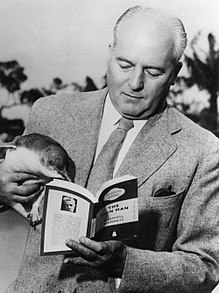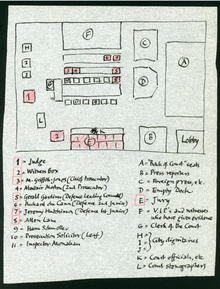

R v Penguin Books Ltd[a] (also known as The Lady Chatterley Trial), was the public prosecution in the United Kingdom of Penguin Books under the Obscene Publications Act 1959[b] for the publication of D. H. Lawrence's 1928 novel Lady Chatterley's Lover. The trial took place over six days, in No 1 court of the Old Bailey, between 20 October and 2 November 1960 with Mervyn Griffith-Jones[c] prosecuting, Gerald Gardiner counsel for the defence[d] and Laurence Byrne presiding. The trial was a test case of the defence of public good provision under section 4 of the Act which was defined as a work "in the interests of science, literature, art or learning, or of other objects of general concern".
The jury found for the defendant in a result that ushered in the liberalisation of publishing, and which some saw as the beginning of the permissive society in Britain.[3]
- ^ Rolph, 1961, p. 35
- ^ https://web.archive.org/web/20211112213256/https://www.artscouncil.org.uk/sites/default/files/items_export_deferral/Expert%27s%20statement_Chatterley.pdf
- ^ Feather, John. A History of British Publishing. p. 205.
Cite error: There are <ref group=lower-alpha> tags or {{efn}} templates on this page, but the references will not show without a {{reflist|group=lower-alpha}} template or {{notelist}} template (see the help page).